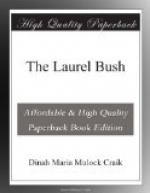Chapter 5
“Shall sharpest pathos blight us, doing no wrong?”
So writes our greatest living poet, in one of the noblest poems he ever penned. And he speaks truth. The real canker of human existence is not misery, but sin.
After the first cruel pang, the bitter wail; after her lost life—and we have here but one life to lose!—her lost happiness, for she knew now that though she might be very peaceful, very content, no real happiness ever had come, ever could come to her in this world, except Robert Roy’s love—after this, Fortune sat down, folded her hands, and bowed her head to the waves of sorrow that kept sweeping over her, not for one day or two days, but for many days and weeks—the anguish, not of patience, but regret—sharp, stinging, helpless regret. They came rolling in, those remorseless billows, just like the long breakers on the sands of St. Andrews. Hopeless to resist, she could only crouch down and let them pass. “All Thy waves have gone over me.”
Of course this is spoken metaphorically. Outwardly, Miss Williams neither sat still nor folded her hands. She was seen every where as usual, her own proper self, as the world knew it; but underneath all that was the self that she knew, and God knew. No one else. No one ever could have known, except Robert Roy, had things been different from what they were—from what God had apparently willed them to be.
A sense of inevitable fate came over her. It was now nearly two years since that letter from Mr. Roy of Shanghai, and no more tidings had reached her. She began to think none ever would reach her now. She ceased to hope or to fear, but let herself drift on, accepting the small pale pleasures of every day, and never omitting one of its duties. One only thought remained; which, contrasted with the darkness of all else, often gleamed out as an actual joy.
If the lost letter really was Robert Roy’s—and though she had no positive proof, she had the strongest conviction, remembering the thick fog of that Tuesday morning, how easily Archy might have dropped it out of his hand, and how, during those days of soaking rain, it might have lain, unobserved by any one, under the laurel branches, till the child picked it up and hid it as he said—if Robert Roy lad written to her, written in any way, he was at least not faithless. And he might have loved her then. Afterward, he might have married, or died; she might never find him again in this world, or if she found him, he might be totally changed: still, whatever happened, he had loved her. The fact remained. No power in earth or heaven could alter it.
And sometimes, even yet, a half-superstitious feeling came over her that all this was not for nothing—the impulse which had impelled her to write to Shanghai, the other impulse, or concatenation of circumstances, which had floated her, after so many changes, back to the old place, the old life. It looked like chance, but was it? Is any thing chance? Does not our own will, soon or late, accomplish for us what we desire? That is, when we try to reconcile it to the will of God.




